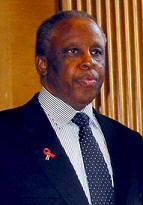Mogae Criticizes Campaigns Against Botswana Diamond Mining
November 14, 06
Hailing the role of diamonds in
|
|
Separating them from organizations that lobby for the rights of women or fight for HIV treatments, of which he said they play a positive role, Mogae did not spare words about those, “campaigning against our country's sovereign right to provide education and improve health and other services to our remote based communities.
“Whilst those foreigners readily appreciate the value of educating their own children, they claim that by educating Basarwa children, we are violating Basarwa's rights and destroying their culture. “
Mogae said it is, “the same organizations that are campaigning for the boycott of our tourism industry and diamonds, regardless of the negative impact that would have on our country, including the very people whose interests they claim to represent.” He went as far as saying that they are campaigning “to have our country carved up into exclusive apartheid style tribal entities.”
He went on to stress that if those campaigns succeed, the county will lose the diamond revenues that fund childrens' education, buy anti-retroviral HIV drugs, and provide money to care for orphans. He said it will lead to, “a drastic reversal of the economic gains we have made since our independence.” The president said, and called such NGO's, “the enemies of our success.”
He than went on to speak about the role of diamonds in Botswana. “There can be no doubt, that diamonds have played a major part in the transformation of our country's fortunes and the lives of our citizens.
“The mining sector, of which diamonds are a large part, accounts for 75 percent of Botswana's export earnings, about 50 percent of government revenue, and 37.5 percent of Gross Domestic Product. Revenue from diamonds has enabled government to fund virtually 100 percent of basic education, provide virtually free health care, build the infrastructure that has supported our economic activity, and to fund 80 percent of the anti-retroviral drugs that have given hope to our fellow citizens living with HIV/AIDS.”
When discussing mining in the country, Mogae noted strong commodity prices resulting from accelerated growth in
As an example, he mentioned a license issued to Diamonex Limited to re-open the Lerala diamond pipes, which were mined on a trial basis by Tswapong in the 1990s. Some 300,000 carats are expected to be mined there annually over a 15 year period.
Regarding diamond cutting and polishing in the country, President Mogae spoke of the increased number of polishing licenses and employment in the sector. “Until December 2005, the diamond cutting and polishing industry was operating with only four factories. Eleven more factories have since been licensed, bringing the total to 15. Up to 2004, the then existing factories employed only 600 people.”
He noted DTC Sightholder Eurostar in particular, saying that in 2005, employment increased by 25 percent to 954 employees with the establishment of Eurostar’s polishing plant. “It is now expected that over 3,400 new jobs will be created once the 15 diamond cutting and polishing companies have set up their operations.”
